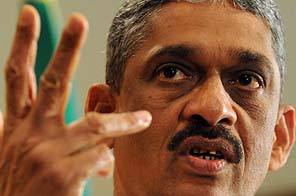Sri Lanka's defeated presidential candidate arrested
COLOMBO: The defeated candidate in Sri Lanka's presidential vote, former army chief Sarath Fonseka, was arrested hours after vowing to give evidence before any war crimes tribunal.
State media said Fonseka, who led the army to victory over Tamil Tiger rebels last year, ending a bloody 37-year insurgency, was taken into custody Monday by the military police to be charged with unspecified "military offences".
The 59-year-old retired four-star general, who lost to President Mahinda Rajapakse in the January 26 election, was seized by troops who stormed the offices of the main opposition alliance, which had backed his candidacy.
"They forcibly took away General Fonseka while he was having a discussion with three other senior opposition leaders," a spokesman for the People's Liberation Front (JVP) told AFP.
"They grabbed him and virtually carried him away after threatening the others," the spokesman said. "There must have been over 100 soldiers."
The office was cordoned off by heavily armed troops who blocked reporters and photographers from entering the building.
Fonseka's campaign manager, Senaka de Silva, was also taken away, witnesses said.
Official sources confirmed that Fonseka was seized by military police who took him to a doctor to check his medical condition before formally placing him under arrest.
A day earlier a private newspaper said Fonseka could be court-martialled on charges of plotting a coup.
Earlier this month, Rajapakse sacked a dozen senior military officers whom the defence ministry said were a "direct threat" to national security.
Rajapakse won last month's election easily but Fonseka vowed to challenge the result in the Supreme Court. The United States and the European Commission have meanwhile pressed for a probe into allegations of vote fraud.
Foneska has claimed that the government arrested more than 50 people from his office to prevent evidence being collected to support his challenge to the result.
He had also been keen to contest parliamentary elections, which the government is expected to call within days.
His detention prompted concern from the United States, which said it could worsen divisions as the island recovers from war.
"There is a tremendous need for the government of Sri Lanka to work to overcome the fissures that exist within its society," State Department spokesman Philip Crowley told AFP.
"It has to be very cautious that any actions it takes are designed to heal the split within Sri Lankan society, not to exacerbate it," he said.
"Whatever the government does has implications for how democratic institutions are perceived in the future," Crowley said.
Fonseka holds US residency, although officials said it did not affect their treatment of him.
Another official in Washington told AFP that US diplomats had been working behind the scenes to encourage Rajapakse to be cautious, warning that an arrest of Fonseka without legal grounding would have a serious effect on relations.
Amnesty International accused Colombo of stepping up a "crackdown on political opposition" and urged Rajapakse to make progress on human rights.
Fonseka's detention "escalates post-election repression", Sam Zarifi, the rights group's Asia-Pacific director, said in a statement released in London.
Hours before the dramatic arrest, Fonseka told reporters that he would face any international probe into alleged war crimes committed by Sri Lankan troops in the final stages of battling Tamil rebels last year.
In contrast, the government has resisted international calls for an investigation amid charges that a senior defence official ordered the killing in cold blood of surrendering rebel leaders.
"I am prepared to go before any investigation and give evidence," Fonseka said. "I am not prepared to protect anyone, if they have committed war crimes."
During their head-to-head at the ballot box, both Fonseka and Rajapakse sought to take credit for the spectacular military success that ended the Tigers' armed campaign for an independent Tamil homeland.
The United Nations says 7,000 civilians died during the final stages of fighting and has called on Sri Lanka to account for alleged extrajudicial killings of Tamil prisoners.






